Résultats de recherche de titre
Articles 1495041 à 1495060 sur 1497515
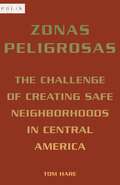
Zonas Peligrosas: The Challenge of Creating Safe Neighborhoods in Central America examines indicators of orderliness and security in El Salvador,…
shows how policies and programs based on disorganization theory have been used, and why they might not make Salvadoran urban dwellers safer. In Latin America, these prescriptions form the basis for what has become known as “citizen security” policy. Just as in disorganization theory, citizen security emphasizes strong social cohesion and expectations for action on the part of neighbors and civil society. Mimicking the methodology of disorganization theorists from the Chicago School, Tom Hare conducted four neighborhood studies in the San Salvador metropolitan area. Mixed methods, including two hundred original survey-interviews, were used to create a rich description of each case. The cases were selected in order to compare and contrast the social order in neighborhoods with varying levels of security and physical and demographic makeup.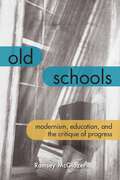
Old Schools: Modernism, Education, and the Critique of Progress (Lit Z)
Par Ramsey McGlazer. 2020
Winner: AAIS First Book PrizeOld Schools marks out a modernist countertradition. The book makes sense of an apparent anachronism in…
twentieth-century literature and cinema: a fascination with outmoded, paradigmatically pre-modern educational forms that persists long after they are displaced in progressive pedagogical theories.Advocates of progressive education turned against Latin in particular. The dead language—taught through time-tested means including memorization, recitation, copying out, and other forms of repetition and recall—needed to be updated or eliminated, reformers argued, so that students could breathe free and become modern, achieving a break with convention and constraint. Yet McGlazer’s remarkable book reminds us that progressive education was championed not only by political progressives, but also by Fascists in Italy, where it was an object of Gramsci’s critique. Building on Gramsci’s pages on the Latin class, McGlazer shows how figures in various cultural vanguards, from Victorian Britain to 1970s Brazil, returned to and reimagined the old school.Strikingly, the works that McGlazer considers valorize this school’s outmoded techniques even at their most cumbersome and conventional. Like the Latin class to which they return, these works produce constraints that feel limiting but that, by virtue of that limitation, invite valuable resistance. As they turn grammar drills into verse and repetitious lectures into voiceovers, they find unlikely resources for critique in the very practices that progressive reformers sought to clear away.Registering the past’s persistence even while they respond to the mounting pressures of modernization, writers and filmmakers from Pater to Joyce to Pasolini retain what might look like retrograde attachments—to tradition, transmission, scholastic rites, and repetitive forms. But the counter-progressive pedagogies that they devise repeat the past to increasingly radical effect. Old Schools teaches us that this kind of repetition can enable the change that it might seem to impede.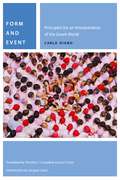
Form and Event: Principles for an Interpretation of the Greek World (Commonalities)
Par Carlo Diano. 2020
Carlo Diano’s Form and Event has long been known in Europe as a major work not only for classical studies…
but even more for contemporary philosophy. Already available in Italian, French, Spanish, and Greek, it appears here in English for the first time, with a substantial Introduction by Jacques Lezra that situates the book in the genealogy of modern political philosophy.Form and Event reads the two classical categories of its title phenomenologically across Aristotle, the Stoics, and especially Homer. By aligning Achilles with form and Odysseus with event, Diano links event to embodied and situated subjective experience that simultaneously finds its expression in a form that objectifies that experience. Form and event do not exist other than as abstractions for Diano but they do come together in an intermingling that Diano refers to as the “eventic form.” On Diano’s reading, eventic forms interweave subjectively situated and embodied experiences, observable in all domains of human and nonhuman life.A stunning interpretation of Greek antiquity that continues to resonate since its publication in 1952, Form and Event anticipates the work of such French and Italian post-war thinkers as Gilles Deleuze, Alain Badiou, Roberto Esposito, and Giorgio Agamben.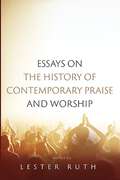
Essays on the History of Contemporary Praise and Worship
Par Lester Ruth. 2020
Seeking to push the historical study of the liturgical phenomenon known as “Contemporary Worship” or “Praise and Worship” to a…
new level, this collection of essays offers an introduction to the phenomenon, documents critical aspects of its development, and suggests methods for future historical study. This multi-authored work investigates topics in both the Pentecostal and mainline branches of this way of worship, looking at subjects little explored by prior work. The provocative issues explored include Integrity Hosanna! Music, James White, charismatic renewal, John Wimber, the development of second services, Black Gospel, overlooked (non-white) sources of worship music, degree programs for worship leaders, and Robert Webber.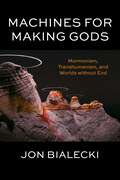
Machines for Making Gods: Mormonism, Transhumanism, and Worlds without End
Par Jon Bialecki. 2022
The Mormon faith may seem so different from aspirations to transcend the human through technological means that it is hard…
to imagine how these two concerns could even exist alongside one another, let alone serve together as the joint impetus for a social movement. Machines for Making Gods investigates the tensions between science and religion through which an imaginative group of young Mormons and ex-Mormons have found new ways of understanding the world.The Mormon Transhumanist Association (MTA) believes that God intended humanity to achieve Mormonism’s promise of theosis through imminent technological advances. Drawing on a nineteenth-century Mormon tradition of religious speculation to reimagine Mormon eschatological hopes as near-future technological possibilities, they envision such current and possible advances as cryonic preservation, computer simulation, and quantum archeology as paving the way for the resurrection of the dead, the creation of worlds without end, and promise of undergoing theosis—of becoming a god. Addressing the role of speculation in the anthropology of religion, Machines for Making Gods undoes debates about secular transhumanism’s relation to religion by highlighting the differences an explicitly religious transhumanism makes.Charting the conflicts and resonances between secular transhumanism and Mormonism, Bialecki shows how religious speculation has opened up imaginative horizons to give birth to new forms of Mormonism, including a particular progressive branch of the faith and even such formations as queer polygamy. The book also reveals how the MTA’s speculative account of God and technology together has helped to forestall some of the social pressure that comes with apostasy in much of the Mormon Intermountain West.A fascinating ethnography of a group with much to say about crucial junctures of modern culture, Machines for Making Gods illustrates how the scientific imagination can be better understood when viewed through anthropological accounts of myth.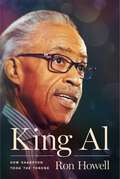
King Al: How Sharpton Took the Throne
Par Ron Howell. 2021
The incredible story of the man and legend who has come to symbolize the continuing pursuit of justice for Blacks…
in the United StatesThrough the 1980s, the mainstream press portrayed the Reverend Al Sharpton as a buffoon, a fake minister, a hustler, an opportunist, a demagogue, a race traitor, and an anti-Semite. Today, Sharpton occupies a throne that would have shocked the white newspaper reporters who covered him forty years ago. A mesmerizing story of astounding transformation, craftiness, and survival, King Al follows Reverend Sharpton’s life trajectory, from his early life as a boy preacher to his present moment as the most popular Black American activist/minister/cable news host.In the 1980s, Rev. Al created controversies that would have doomed a lesser man to the dustbin of history. Among these controversies were his work with the FBI as the agency attempted to locate Black Liberation Army leader Assata Shakur; and his involvement in the 1987 Tawana Brawley episode. Regarding the Brawley matter, a white prosecutor sued Sharpton, successfully, for falsely accusing him of having raped the then-fifteen-year-old Brawley.It was the white press, in its glory days, that created the podium from which Sharpton became both famous and infamous. Those reporters would joke that the most dangerous place in New York was between Al Sharpton and a television camera. But it was those reporters who made Sharpton the media figure he is today.Today, as host of MSNBC’s PoliticsNation news program, Sharpton has more news viewers than those reporters ever had readers.The Reverend Al’s rise to respectability is a testament to an endurance and boldness steeped in Black American history. Born in Brooklyn to parents from the old slave-holding South, he transformed himself into one of the most respected and politically influential Blacks in the United States.In his in-depth coverage, author Ron Howell tells the stories of Sharpton’s ascendance to the throne. He tells us about the glory years of American newspapers, when Sharpton began his rise. And he tells us about the politicians who intersected with Sharpton as he climbed the ladder.King Al is an engaging read about the late-twentieth-century history of New York City politics and race relations, as well as about the remarkable staying power of the colorful, politically skillful, and enigmatic Sharpton.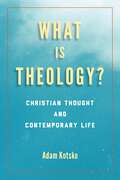
The secular world may have thought it was done with theology, but theology was not done with it. Recent decades…
have seen a resurgence of religion on the social and political scene, which have driven thinkers across many disciplines to grapple with the Christian theological inheritance of the modern world. Adam Kotsko provides a unique guide to this fraught terrain. The title essay establishes a fresh and unexpected redefinition of theology and its complex and often polemical relationship with its sister discipline of philosophy. Subsequent essays build on this framework from three different perspectives. In the first part, Kotsko demonstrates the continued vibrancy of Christian theology as a creative and constructive pursuit outside the walls of the church, showing that theological concepts can underwrite a powerful critique of the modern world. The second approaches Christian theology from the perspective of a range of contemporary philosophers, showing how philosophical thought is drawn to theology even despite itself. The concluding section is devoted to the unexpected theological roots of the modern world-system, making a case that the interplay of state and economy and the structure of modern racial oppression both build on theological patterns of thought.Kotsko’s book ultimately shows that theology is not a scholarly game or an edifying spiritual discipline, but a world-shaping force of great power. Lives are at stake when we do theology—and if we don’t do it, someone else will.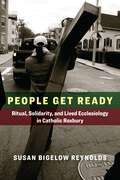
People Get Ready: Ritual, Solidarity, and Lived Ecclesiology in Catholic Roxbury (Catholic Practice in the Americas)
Par Susan Bigelow Reynolds. 2023
WINNER, COLLEGE THEOLOGY SOCIETY 2024 BEST BOOK AWARDWhat does it mean to be a community of difference?St. Mary of the…
Angels is a tiny underground Catholic parish in the heart of Boston’s Egleston Square. More than a century of local, national, and international migrations has shaped and reshaped the neighborhood, transforming streets into borderlines and the parish into a waystation. Today, the church sustains a community of Black, Caribbean, Latin American, and Euro-American parishioners from Roxbury and beyond. In People Get Ready, Susan Reynolds draws on six years of ethnographic research to examine embodied ritual as a site of radical solidarity in the local church. Weaving together archived letters, oral histories, stories, photographs, newspaper articles, and newly examined archdiocesan documents, Reynolds traces how the people of St. Mary’s constructed rituals of solidarity as a practical foundation for building bridges across difference. She looks beyond liturgy to unexpected places, from Mass announcements to parish council meetings, from the Good Friday Via Crucis through neighborhood streets to protests staged in and around the church in the wake of Boston’s 2004 parish shutdowns. Through ethnography and Catholic ecclesiology, Reynolds argues for a retrieval of Vatican II’s notion of ecclesial solidarity as a basis for the mission of the local church in an age of migration, displacement, and change.It is through the work of ritual, the story of St. Mary’s reveals, that we learn to negotiate the borders in our midst—to cultivate friendships, exercise power, build peace, and, in a real way, to survive.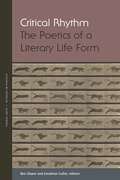
Critical Rhythm: The Poetics of a Literary Life Form (Verbal Arts: Studies in Poetics)
Par Ben Glaser and Jonathan Culler. 2019
This book shows how rhythm constitutes an untapped resource for understanding poetry. Intervening in recent debates over formalism, historicism, and…
poetics, the authors show how rhythm is at once a defamiliarizing aesthetic force and an unstable concept. Distinct from the related terms to which it’s often assimilated—scansion, prosody, meter—rhythm makes legible a range of ways poetry affects us that cannot be parsed through the traditional resources of poetic theory.Rhythm has rich but also problematic roots in still-lingering nineteenth-century notions of primitive, oral, communal, and sometimes racialized poetics. But there are reasons to understand and even embrace its seductions, including its resistance to lyrical voice and even identity. Through exploration of rhythm’s genealogies and present critical debates, the essays consistently warn against taking rhythm to be a given form offering ready-made resources for interpretation. Pressing beyond poetry handbooks’ isolated descriptions of technique or inductive declarations of what rhythm “is,” the essays ask what it means to think rhythm.Rhythm, the contributors show, happens relative to the body, on the one hand, and to language, on the other—two categories that are distinct from the literary, the mode through which poetics has tended to be analyzed. Beyond articulating what rhythm does to poetry, the contributors undertake a genealogical and theoretical analysis of how rhythm as a human experience has come to be articulated through poetry and poetics. The resulting work helps us better understand poetry both on its own terms and in its continuities with other experiences and other arts.Contributors: Derek Attridge, Tom Cable, Jonathan Culler, Natalie Gerber, Ben Glaser, Virginia Jackson, Simon Jarvis, Ewan Jones, Erin Kappeler, Meredith Martin, David Nowell Smith, Yopie Prins, Haun Saussy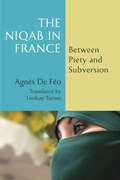
The Niqab in France: Between Piety and Subversion
Par Agnès De Féo. 2024
This original new work is the fascinating result of sociologist and documentary filmmaker Agnès De Féo’s ten-year exploration of the…
phenomenon of niqab wearing. It is at once a groundbreaking study and a series of compelling first-person accounts from French and Francophone women who wear or have worn the niqab in France’s Salafi communities. With the backdrop of the French government’s 2010 ban on full facial veiling in public spaces, which itself has shaped the phenomenon, De Féo draws on her subjects’ own words to show their agency, working against the clichés that often underlie public views of the niqab—that it is purely the result of masculine pressure, for example, or extreme religiosity or nationalism, or the submissive desire to disappear. Instead, she shows, the niqab is multivalent: women wear it for reasons that range from religious piety to the desire to rebel against mainstream society, family, or the rule of law. The reasons are complex, overdetermined, contradictory, or even inconsistent, but they are the women’s own. Despite being worn only by a small minority of Muslim women, the Islamic garment has nonetheless been a major source of intense political, religious, and cultural debate in France. Searching to understand, rather than speculate, De Féo chose to approach the people who wear the niqab, and to make them, rather the veil itself, the subject of her research. Her unprecedented study, based on more than 200 interviews, reveals the many factors—social, political, geopolitical, and psychological—underpinning a personal choice that is not always as religious as it seems.The book ends with sixteen captivating interviews giving voice to stories rarely heard. With finesse and discernment, the author debunks the myths surrounding the wearing of the niqab, and sheds light on a practice subject to misunderstanding and prejudice, offering the reader unique insight. Challenging our preconceived notions and stereotypes about women who wear any form of Islamic apparel, but particularly the niqab, The Niqab in France introduces a group of women each with her own life story, her own share of personal struggles, aspirations, and desires, and her own claim to a certain place in society.This work received support for excellence in publication and translation from Albertine Translation, a program created by Villa Albertine.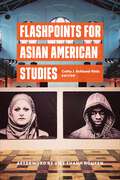
Flashpoints for Asian American Studies
Par Cathy J. Schlund–Vials, Editor. 2018
Emerging from mid-century social movements, Civil Rights Era formations, and anti-war protests, Asian American studies is now an established field…
of transnational inquiry, diasporic engagement, and rights activism. These histories and origin points analogously serve as initial moorings for Flashpoints for Asian American Studies, a collection that considers–almost fifty years after its student protest founding--the possibilities of and limitations inherent in Asian American studies as historically entrenched, politically embedded, and institutionally situated interdiscipline. Unequivocally, Flashpoints for Asian American Studies investigates the multivalent ways in which the field has at times and—more provocatively, has not—responded to various contemporary crises, particularly as they are manifest in prevailing racist, sexist, homophobic, and exclusionary politics at home, ever-expanding imperial and militarized practices abroad, and neoliberal practices in higher education.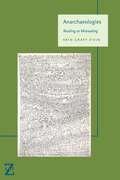
Anarchaeologies: Reading as Misreading (Lit Z)
Par Erin Graff Zivin. 2020
How do we read after the so-called death of literature? If we are to attend to the proclamations that the…
representational apparatuses of literature and politics are dead, what aesthetic, ethical, and political possibilities remain for us today? Our critical moment, Graff Zivin argues, demands anarchaeological reading: reading for the blind spots, errors, points of opacity or untranslatability in works of philosophy and art.Rather than applying concepts from philosophy in order to understand or elucidate cultural works, the book exposes works of philosophy, literary theory, narrative, poetry, film, and performance art and activism to one another. Working specifically with art, film, and literature from Argentina (Jorge Luis Borges, Juán José Saer, Ricardo Piglia, César Aira, Albertina Carri, the Internacional Errorista), Graff Zivin allows such thinkers as Levinas, Derrida, Badiou, and Rancière to be inflected by Latin American cultural production. Through these acts of interdiscursive and interdisciplinary (or indisciplinary) exposure, such ethical and political concepts as identification and recognition, decision and event, sovereignty and will, are read as constitutively impossible, erroneous. Rather than weakening either ethics or politics, however, the anarchaeological reading these works stage and demand opens up and radicalizes the possibility of justice.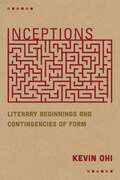
Inceptions: Literary Beginnings and Contingencies of Form
Par Kevin Ohi. 2021
The beginning is both internal and external to the text it initiates, and that noncoincidence points to the text’s vexed…
relation with its outside. Hence the nontrivial self-reflexivity of any textual beginning, which must bear witness to the self-grounding quality of the literary work— its inability either to comprise its inception or to externalize it in an authorizing exteriority. In a different but related way, the fact that they must begin renders our lives and our desires opaque to us; what Freud called “latency” marks not only sexuality but human thought with a self-division shaped by asynchronicity.From Henry James’s New York Edition prefaces to George Eliot’s epigraphs, from Ovid’s play with meter to Charles Dickens’s thematizing of the ex nihilo emergence of character, from Wallace Stevens’s abstract consideration of poetic origins to James Baldwin’s, Carson McCullers’s, and Eudora Welty’s descriptions of queer childhood, writers repeatedly confront the problem of inception. Inception introduces a fundamental contingency into texts and psyches alike: in the beginning, all could have been otherwise.For Kevin Ohi, the act of inception, and the potential it embodies, enables us to see making and unmaking coincide within the mechanism of creation. In this sense, Inceptions traces an ethics of reading, the possibility of perceiving, in the ostensibly finished forms of lives and texts, the potentiality inherent in their having started forth.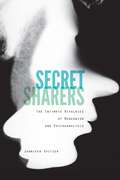
Secret Sharers: The Intimate Rivalries of Modernism and Psychoanalysis
Par Jennifer Spitzer. 2023
Secret Sharers traces a genealogy of secret sharing between literary modernism and psychoanalysis, focusing on the productive entanglements and intense…
competitive rivalries that helped shape Anglo-American modernism as a field. As Jennifer Spitzer reveals, such rivalries played out in explicit criticism, inventive misreadings, and revisions of Freudian forms—from D. H. Lawrence’s re-descriptions of the unconscious to Vladimir Nabokov’s parodies of the psychoanalytic case study. While some modernists engaged directly with Freud and Freudian psychoanalysis with unmistakable rivalry and critique, others wrestled in more complex ways with Freud’s legacy. The key protagonists of this study—D. H. Lawrence, Virginia Woolf, W. H. Auden, and Vladimir Nabokov—are noteworthy for the way they engaged with, popularized, and revised the terms of Freudian psychoanalysis, while also struggling with it as an encroaching discourse. Modernists read psychoanalysis, misread psychoanalysis, and sometimes refused to read it altogether, while expressing anxiety about being read by psychoanalysis—subjecting themselves and their art to psychoanalytic interpretations.As analysts, such as Freud, Ernest Jones, and Alfred Kuttner, turned to literature and art to illustrate psychoanalytic theories, modernists sought to counter such reductive narratives by envisioning competing formulations of the relationship between literature and psychic life. Modernists often expressed ambivalence about the probing, symptomatic style of psychoanalytic interpretation and responded with a re-doubling of arguments for aesthetic autonomy, formal self-consciousness, and amateurism. Secret Sharers reveals how modernists transformed the hermeneutic and diagnostic priorities of psychoanalysis into novel aesthetic strategies and distinctive modes of epistemological and critical engagement. In reassessing the historical and intellectual legacies of modernism, this book suggests that modernist responses to psychoanalytic criticism anticipate more recent critical debates about the value of “symptomatic” reading and the “hermeneutics of suspicion.”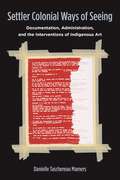
Settler Colonial Ways of Seeing: Documentation, Administration, and the Interventions of Indigenous Art
Par Danielle Taschereau Mamers. 2024
An innovative analysis of Indigenous strategies for overcoming the settler state.How do bureaucratic documents create and reproduce a state’s capacity…
to see? What kinds of worlds do documents help create? Further, how might such documentary practices and settler colonial ways of seeing be refused?Settler Colonial Ways of Seeing investigates how the Canadian state has used documents, lists, and databases to generate, make visible—and invisible—Indigenous identity. With an archive of legislative documents, registration forms, identity cards, and reports, Danielle Taschereau Mamers traces the political and media history of Indian status in Canada, demonstrating how paperwork has been used by the state to materialize identity categories in the service of colonial governance. Her analysis of bureaucratic artifacts is led by the interventions of Indigenous artists, including Robert Houle, Nadia Myre, Cheryl L’Hirondelle, and Rebecca Belmore. Bringing together media theories of documentation and the strategies of these artists, Settler Colonial Ways of Seeing develops a method for identifying how bureaucratic documents mediate power relations as well as how those relations may be disobeyed and re-imagined.By integrating art-led inquiry with media theory and settler colonial studies approaches, Taschereau Mamers offers a political and media history of the documents that have reproduced Indian status. More importantly, she provides us with an innovative guide for using art as a method of theorizing decolonial political relations. This is a crucial book for any reader interested in the intersection of state archives, settler colonial studies, and visual culture in the context of Canada’s complex and violent relationship with Indigenous peoples.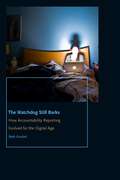
Perhaps no other function of a free press is as important as the watchdog role—its ability to monitor the work…
of the government. It is easier for politicians to get away with abusing power—wasting public funds and making poor decisions—if the press is not shining its light with what is termed “accountability reporting.” This need has become especially clear in recent months, as the American press has come under virulent direct attack for carrying out its watchdog duties. Upending the traditional media narrative that watchdog accountability journalism is in a long, dismaying decline, The Watchdog Still Barks presents a study of how this most important form of journalism came of age in the digital era at American newspapers.Although the American newspaper industry contracted significantly during the 1990s and 2000s, Fordham professor and former CBS News producer Beth Knobel illustrates through empirical data how the amount of deep watchdog reporting on the newspapers’ studied front pages generally increased over time despite shrinking circulations, low advertising revenue, and pressure to produce the kind of soft news that plays well on social media. Based on the first content analysis to focus specifically on accountability journalism nationally, The Watchdog Still Barks examines the front pages of nine newspapers located across the United States to paint a broad portrait of how public service journalism has changed since 1991 as the advent of the Internet transformed journalism. This portrait of the modern newspaper industry shows how papers of varying sizes and ownership structures around the country marshaled resources for accountability reporting despite significant financial and technological challenges.The Watchdog Still Barks includes original interviews with editors who explain why they are staking their papers’ futures on the one thing that American newspapers still do better than any other segment of the media: watchdog and investigative reporting.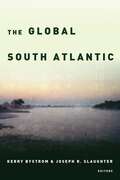
The Global South Atlantic
Par Kerry Bystrom and Joseph R. Slaughter. 2018
Not only were more African slaves transported to South America than to North, but overlapping imperialisms and shared resistance to…
them have linked Africa, Latin America, and the Caribbean for over five centuries. Yet despite the rise in transatlantic, oceanic, hemispheric, and regional studies, and even the growing interest in South-South connections, the South Atlantic has not yet emerged as a site that captures the attention it deserves.The Global South Atlantic traces literary exchanges and interlaced networks of communication and investment—financial, political, socio-cultural, libidinal—across and around the southern ocean. Bringing together scholars working in a range of languages, from Spanish to Arabic, the book shows the range of ways people, governments, political movements, social imaginaries, cultural artefacts, goods, and markets cross the South Atlantic, or sometimes fail to cross.As a region made up of multiple intersecting regions, and as a vision made up of complementary and competing visions, the South Atlantic can only be understood comparatively. Exploring the Atlantic as an effect of structures of power and knowledge that issue from the Global South as much as from Europe and North America, The Global South Atlantic helps to rebalance global literary studies by making visible a multi-textured South Atlantic system that is neither singular nor stable.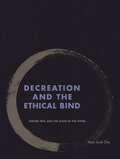
Decreation and the Ethical Bind: Simone Weil and the Claim of the Other
Par Yoon Sook Cha. 2017
In Simone Weil’s philosophical and literary work, obligation emerges at the conjuncture of competing claims: the other’s self-affirmation and one’s…
own dislocation; what one has and what one has to give; a demand that asks for too much and the extraordinary demand implied by asking nothing. The other’s claims upon the self—which induce unfinished obligation, unmet sleep, hunger—drive the tensions that sustain the scene of ethical relationality at the heart of this book.Decreation and the Ethical Bind is a study in decreative ethics in which self-dispossession conditions responsiveness to a demand to preserve the other from harm. In examining themes of obligation, vulnerability, and the force of weak speech that run from Levinas to Butler, the book situates Weil within a continental tradition of literary theory in which writing and speech articulate ethical appeal and the vexations of response. It elaborates a form of ethics that is not grounded in subjective agency and narrative coherence but one that is inscribed at the site of the self’s depersonalization.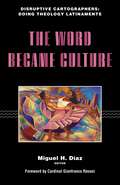
The Word Became Culture (Disruptive Cartographers: Doing Theology Latinamente)
Par Miguel H. Díaz. 2020
Exploring Latin@ theologies and the power of revelation.The Word Became Culture enacts a preferential option for culture, retrieving experiences and…
expressions from across latinidad as sources of theologizing and acts of resistance to marginalization. Each author in this edited volume demonstrates the many ways in which Latin@ theologies are disruptive, generative, and creative spaces rooted in the richness, struggles, texts, and rituals found at the intersections of faith and culture. With a foreword by Cardinal Gianfranco Ravasi, president emeritus of the Pontifical Council for Culture, this book situates Latin@ theologies in the ongoing search for and recognition of the “Word becoming” within the particularities of diverse cultural experiences.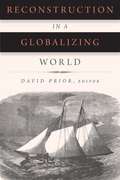
Reconstruction in a Globalizing World (Reconstructing America)
Par David Prior. 2018
As one of the most complexly divisive periods in American history, Reconstruction has been the subject of a rich scholarship.…
Historians have studied the period’s racial views, political maneuverings, divisions between labor and capital, debates about woman suffrage, and of course its struggle between freed slaves and their former masters. Yet, on each of these fronts scholarship has attended overwhelmingly to the eastern United States, especially the South, thereby neglecting important transnational linkages. This volume, the first of its kind, will examine Reconstruction’s global connections and contexts in ways that, while honoring the field’s accomplishments, move it beyond its southern focus.The volume will bring together prominent and emerging scholars to showcase the deepening interplay between scholarships on Reconstruction and on America’s place in world history. Through these essays, Reconstruction in a Globalizing World will engage two dynamic fields of study to the benefit of them both. By demonstrating that the South and the eastern United States were connected to other parts of the globe in complex and important ways, the volume will challenge scholars of Reconstruction to look outwards. Likewise, examining these same connections will compel transnationally-minded scholars to reconsider Reconstruction as a pivotal era in the shaping of the United States’ relations with the rest of the world.